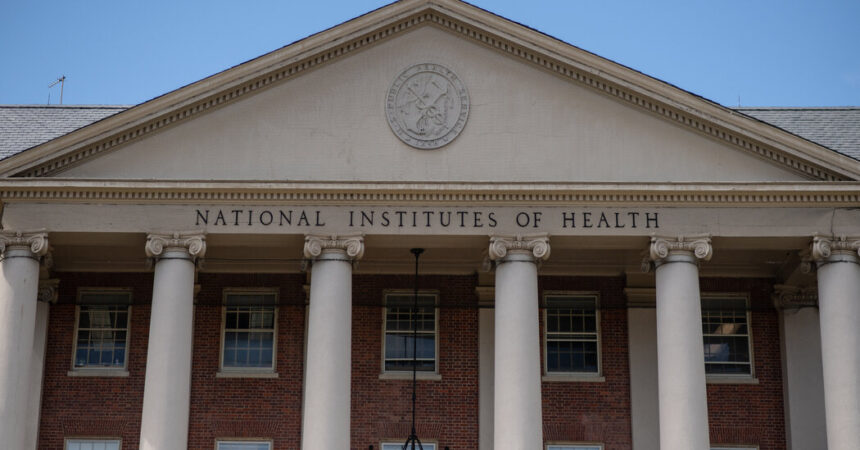Almost two dozen states sued the Trump administration and the Nationwide Institutes of Well being on Monday to dam a $4 billion minimize to analysis funding that scientists say would price hundreds of jobs and eviscerate research into therapies for most cancers, Alzheimer’s, coronary heart illness and a number of different illnesses.
The funding cuts have been to take impact Monday. The attorneys common of Massachusetts and 21 different states filed the go well with, arguing the Trump administration’s plan to slash overhead prices — referred to as “oblique prices” — violates a 79-year-old legislation that governs how administrative companies set up and administer rules.
“With out reduction from N.I.H.’s motion, these establishments’ cutting-edge work to treatment and deal with human illness will grind to a halt,” the lawsuit stated.
On Capitol Hill, Senator Susan Collins of Maine, the chairwoman of the chamber’s Appropriations Committee, strongly objected to what she known as “these arbitrary cuts.” Ms. Collins, a Republican, stated that when she known as President Trump’s nominee for well being secretary, Robert F. Kennedy Jr., to complain, he promised to “re-examine this initiative” if confirmed.
The submitting is the most recent in a string of lawsuits difficult Mr. Trump’s insurance policies. Additionally on Monday, a federal decide in Rhode Island ordered the Trump administration to “instantly restore” trillions of {dollars} in federal grants and loans, together with from the N.I.H., that had been frozen beneath a sweeping directive the president issued, and later rescinded, late final month.
Scientists, medical researchers and public well being officers have felt beneath siege since Mr. Trump turned president. Along with freezing grant {dollars} and slashing overhead prices, the administration has blocked the Facilities for Illness Management and Prevention from publishing scientific data on the specter of chook flu to people.
The lawsuit filed Monday includes a change, introduced Friday by the N.I.H., within the method that the federal government makes use of to find out the share of grant {dollars} that may go towards overhead prices. These bills embody lighting, heating and constructing upkeep, but in addition the maintenance of subtle gear that’s too costly for any single laboratory to purchase by itself.
The plan would price the College of California system tons of of thousands and thousands yearly, the system’s president, Dr. Michael V. Drake, stated.
“A minimize this dimension is nothing wanting catastrophic for numerous People who depend upon U.C.’s scientific advances to save lots of lives and enhance well being care,” Dr. Drake stated in an announcement Monday. “This isn’t solely an assault on science, however on America’s well being writ giant. We should get up towards this dangerous, misguided motion.”
State officers are additionally involved that the cuts might hurt their economies. Massachusetts prides itself on being the “medical analysis capital of the nation,” the state legal professional common, Andrea Pleasure Campbell, a Democrat, stated in saying the go well with, including, “We is not going to permit the Trump administration to unlawfully undermine our financial system, hamstring our competitiveness, or play politics with our public well being.”
The N.I.H. awarded $4.5 billion in analysis funds in Massachusetts lately, together with for analysis on pancreatic most cancers, hypertension and extreme bronchial asthma. The N.I.H. additionally despatched about $5 billion to New York. The minimize is anticipated to price the state about $850 million, the lawsuit stated.
Final 12 months, the N.I.H. stated, $9 billion of $35 billion — or about 26 % — of grant {dollars} it distributed went to overhead, or oblique prices. Some educational establishments commit 50 % or extra of their grant {dollars} to such prices. However the brand new coverage would cap these “oblique funds” at 15 %, saving $4 billion, the administration stated.
Slashing oblique funds was a objective of goal of Undertaking 2025, a set of right-wing coverage proposals put forth by the Heritage Basis as a blueprint for a second Trump administration. The challenge’s report stated the cuts “would assist scale back federal taxpayer subsidization of leftist agendas.”
Administration officers and their allies solid the oblique prices as a taxpayer giveaway to elite universities whose giant endowments, or outdoors funding from non-public foundations, might simply cowl these prices.
“President Trump is removing Liberal DEI Deans’ slush fund,” Katie Miller, a member of the Elon Musk-led effort to slash the scale of the federal authorities, wrote Friday on social media. “This cuts simply Harvard’s outrageous value gouging by ~$250M/ 12 months.”
However Lawrence O. Gostin, an professional in public well being legislation at Georgetown College, stated that many smaller educational establishments, together with traditionally Black schools and universities, shouldn’t have additional funds to cowl these prices, and must cut back medical analysis if the 15 % cap remained intact.
An N.I.H. spokeswoman referred inquiries to its father or mother company, the Division of Well being and Human Companies, which can be named as a defendant within the lawsuit. The division declined to remark, citing the pending litigation.
This isn’t the primary time a Trump administration has moved to chop the funds. In 2017, throughout Mr. Trump’s first time period, an identical proposal would have lowered the overhead funds to 10 % of the award quantity, in keeping with Monday’s lawsuit. The hassle faltered.
Congress then acted to “keep at bay” a future effort and handed a funds invoice that prohibited altering the charges from the degrees that had been negotiated between federal officers and every analysis establishment, in keeping with the lawsuit.
Individuals aware of the negotiations stated these deliberations are complicated, prolonged affairs that contain prices for gadgets like heating payments and personnel, backed by binders filled with supporting data. The lawsuit claims that the administration can not make indiscriminate modifications to the motion that Congress took. It additionally stated the discover saying the speed change violated the Administrative Process Act in a number of methods.
The proposed modifications have been jarring to universities, which had already finalized budgets assuming that the funds would arrive. The modifications have been introduced Friday and have been to take impact Monday.
“There simply isn’t anyplace close to that a lot discretionary cash floating round anyplace,” stated Jeremy Berg, a former N.I.H. division director who oversaw common medical analysis. “The one factor {that a} college might do is do much less analysis and begin firing workers and college. And it could be devastating.”
The cuts’ largest impact would hit the College of California system, which the lawsuit stated will get $2 billion in N.I.H. analysis funds for quite a few universities and most cancers therapy facilities. The funds have supported groundbreaking analysis there, together with the invention of gene enhancing and the primary radiation therapy for most cancers, in keeping with the lawsuit.
Whereas lawsuits towards the Trump administration have tended to be dominated by Democratic-led states, this case additionally has locations that extra not too long ago favored Mr. Trump within the election.
They embody North Carolina, which will get about $3.7 billion in N.I.H. analysis funding awarded to varsities like Duke, the College of North Carolina and Wake Forest. Dr. Robert Lefkowitz, who’s a professor of drugs at Duke and a recipient of the Nobel Prize in Chemistry, stated in an interview over the weekend that “a variety of analysis will simply should cease” if the cuts undergo.
“I can’t think about a greater use of taxpayer cash,” he stated of the funding.
Michigan, a presidential swing state that Mr. Trump carried in November, additionally sued, citing a possible lack of $181 million in funding to the College of Michigan alone. The lawsuit stated the college has 425 N.I.H.-funded trials underway centered on a number of illnesses, “together with 161 trials geared toward saving lives.”
The lawsuit additionally included the presidential battlegrounds of Arizona, Nevada and Wisconsin. The cuts, in keeping with the lawsuit, would carve $65 million from the funds of the College of Wisconsin at Madison, which is learning grownup and pediatric most cancers, diabetes and degenerative neurological illnesses and different circumstances.








